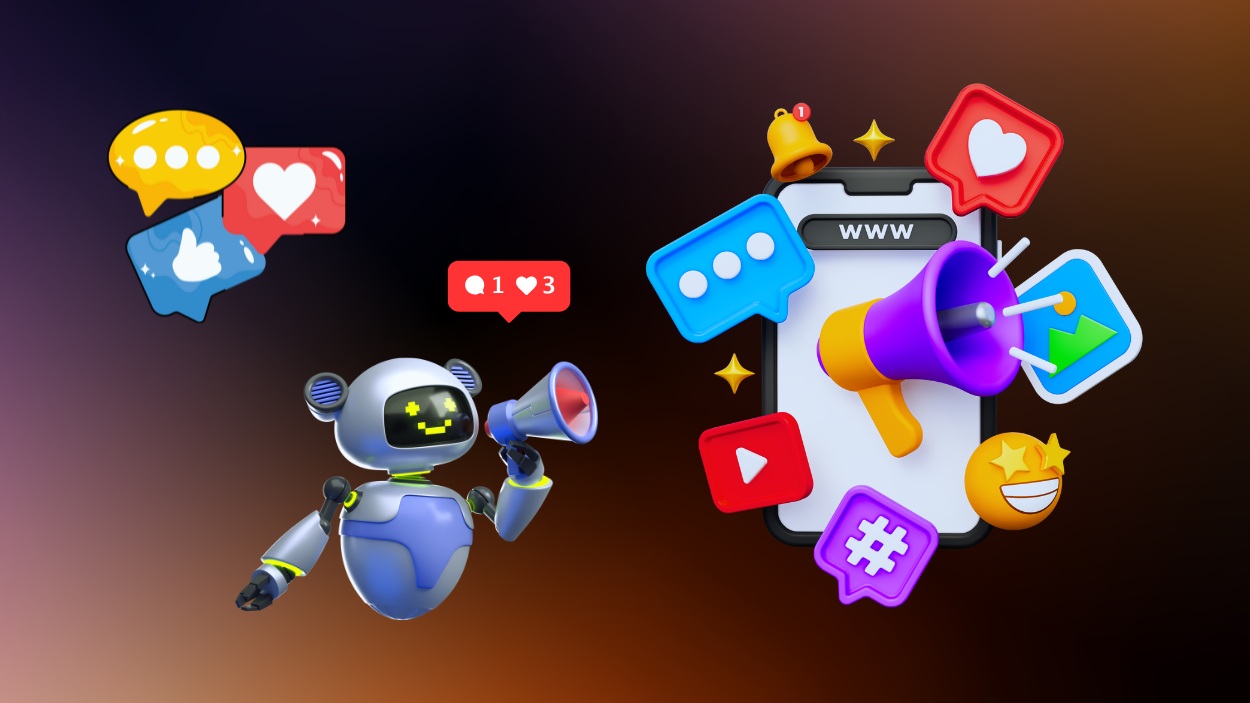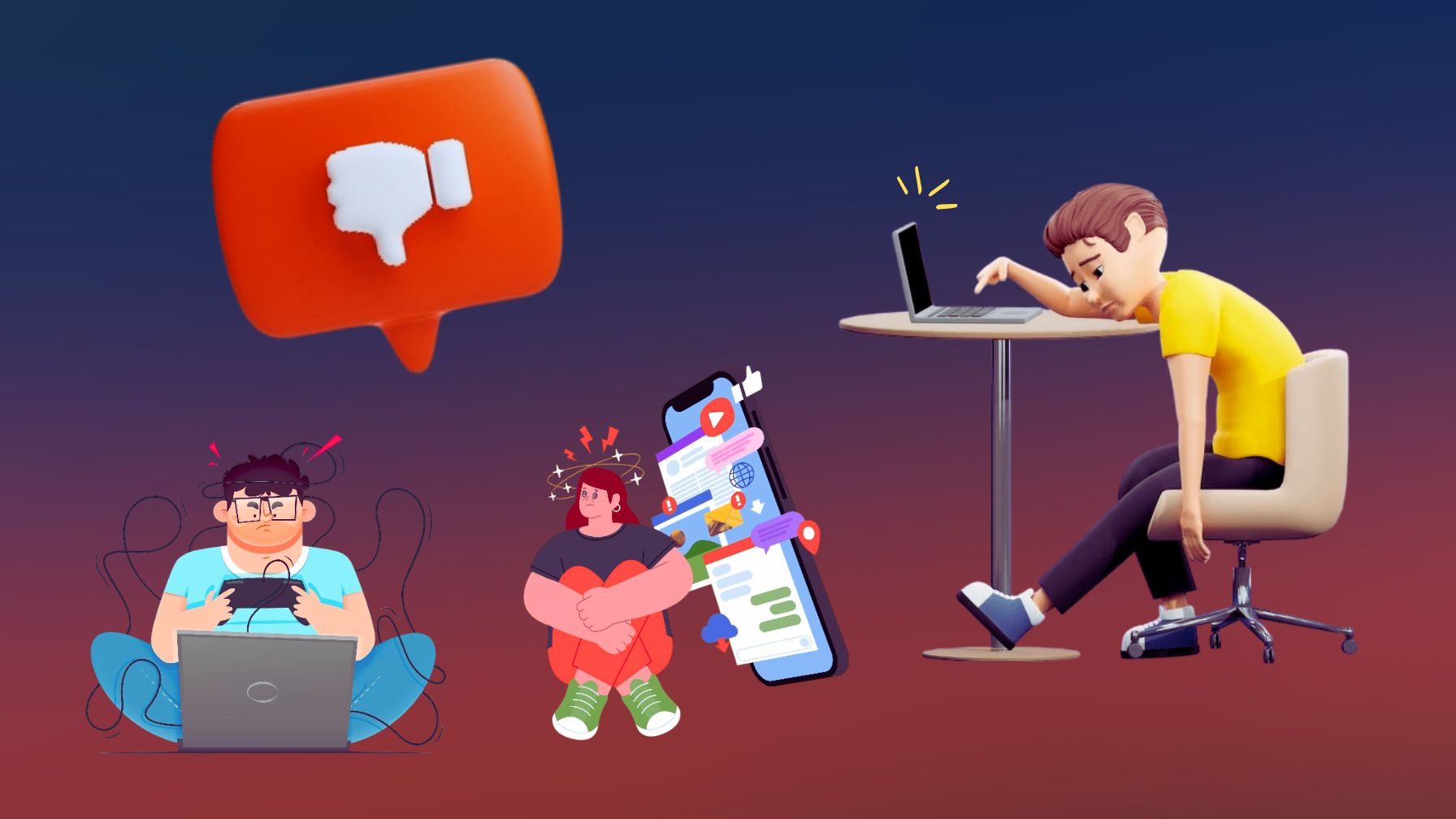AI tools have become integral to how we create, consume, and shape social media content. Industries, from marketing agencies to newsrooms, now rely on AI for content recommendations, engagement analytics, and rapid generation of visuals. For example, over 80% of social media content recommendations are powered by AI, significantly boosting user retention. Likewise, 71% of social media images are AI-generated, reshaping visual storytelling across platforms. Explore below how AI influences trends, usage, and user trust in social media this year.
Editor’s Choice
- 5.45 billion people, about 67.1% of the global population, use social media in 2025, up from 4.72 billion in 2023.
- Users spend roughly 2 hours 24 minutes per day on social platforms, a 5% increase over last year.
- More than 80% of social media content recommendations rely on AI algorithms.
- An estimated 70% of social media images may involve AI tools like Midjourney or DALL·E, reflecting their growing role in content creation across platforms.
- 60% of U.S. companies use generative AI tools to maintain a 24/7 social media presence.
- Recent surveys suggest that approximately 54% of long-form LinkedIn posts may be assisted or influenced by generative AI tools like ChatGPT.
- 60% of marketers plan to use AI in influencer marketing campaigns in 2025.
Recent Developments
- Nine of the top 100 fastest-growing YouTube channels in July 2025 are dedicated entirely to AI-generated content.
- Platforms are starting to label or demonetize low-quality “AI slop” content.
- Lawsuits between traditional media and AI firms, such as Disney vs. Midjourney, highlight rising legal conflicts over content originality and IP.
- Americans report declining trust; only 41% believe what they read online is accurate and human-made, and 78% find it harder than ever to tell human from AI content.
- In early 2025, regions worldwide experienced surging legislative interest in AI, with the U.S. introducing 59 AI-related rules in 2024, up from half in the previous year.
- The term “AI slop” captures rising concern about low-effort, mass-produced content degrading platform quality.
- Public debates intensify over “enshittification”, monetization models that favor AI-generated content over quality human content.
Generative AI Management Techniques Usage
- 48% of businesses report using none of the listed AI management techniques.
- 33% subscribe to paid LLM services (e.g., ChatGPT Plus, Gemini Pro).
- 22% conduct staff training on how to apply Generative AI.
- 17% have an AI governance policy defining how Generative AI should be used.
- 15% subscribe to dedicated paid marketing AI tools (e.g., Copy.AI, Hoppy Copy, Jasper, Writesonic).
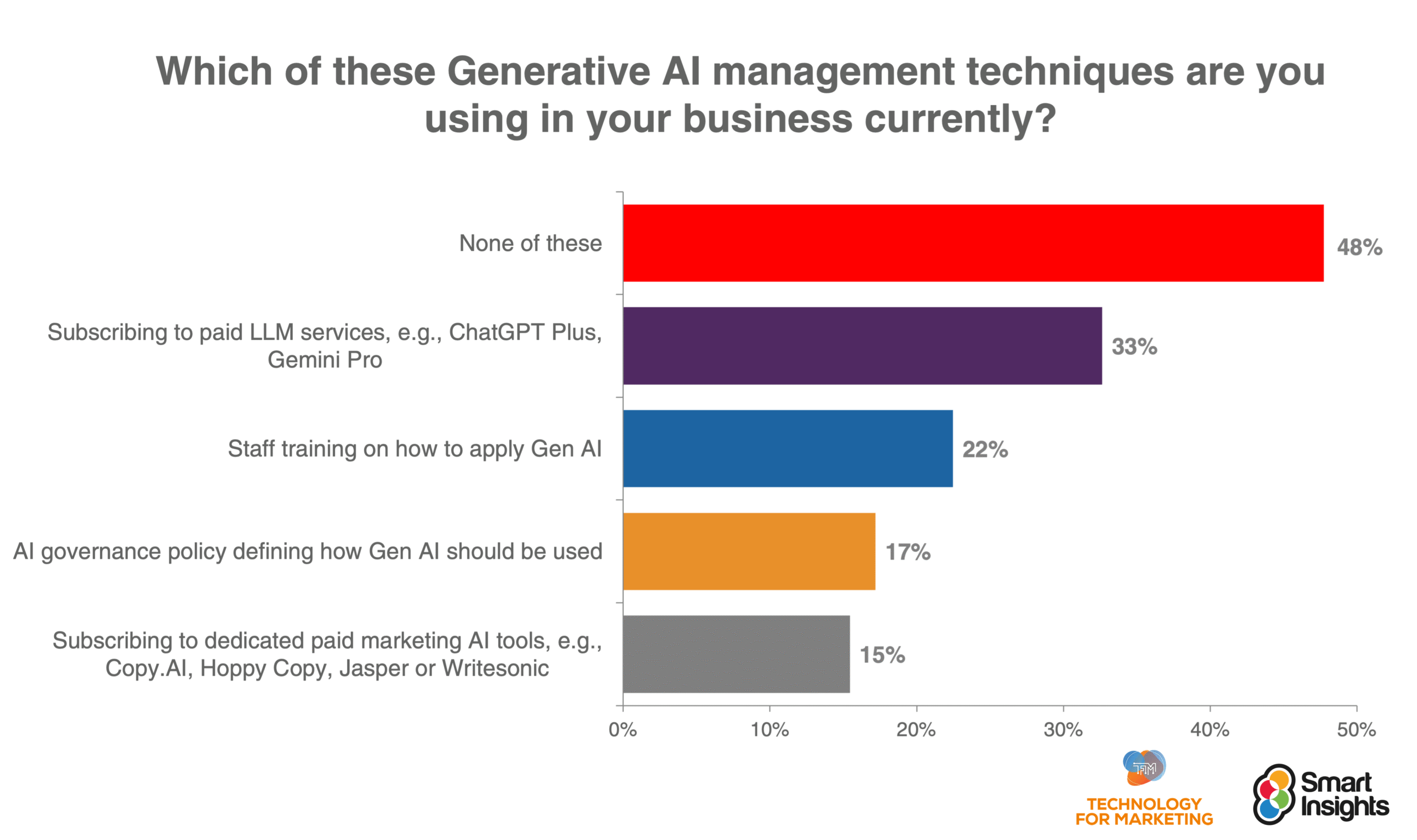
AI Adoption in Social Media Platforms
- 80% of organizations globally are engaging with AI, 35% have fully deployed AI, 42% are piloting tools, and only 13% have no AI plans.
- In the U.S., 60% of companies use generative AI for always-on content strategies.
- AI adoption is rising rapidly, global CAGR for AI use is projected at 35.9% between 2025, 2030.
- 69% of marketers now view AI as revolutionary and job-creating rather than threatening.
- 83% of marketers say generative AI helps them produce much more content than without it.
- 71% of social media marketers embed AI tools into their strategies, and content made with AI outperforms non-AI versions.
- 57% of enterprise marketing teams, vs. 40% at smaller firms, plan to use AI in 2024.
User Engagement and Retention Statistics
- AI-powered recommendations drive over 80% of content discovery, improving stickiness and user retention.
- Daily social media use averages 2 hours 24 minutes, confirming high engagement.
- Generative AI lets marketers deliver up to 72 posts per week, making high-frequency posting sustainable.
- AI tools contribute to significant content volume, with 83% of marketers crediting AI for enabling higher throughput.
- Always-on content strategies, enabled by AI, help brands maintain continuous engagement.
- Platforms penalize low-quality AI “slop”, which can reduce user trust and retention.
- A lack of transparency, like unlabelled AI content, increases distrust and harms engagement.
AI‑Generated Content Statistics
- 71% of images shared on social media are now AI-generated.
- LinkedIn shows over 50% of long-form posts likely created by AI, about 54%.
- About 13% of Reddit posts were likely AI-generated in 2024, up 146% since 2021.
- Many fast-growing YouTube channels rely solely on AI-generated media, 9 out of the top 100 in July 2025.
- AI slop continues to proliferate across Facebook and news sites, intensifying content clutter.
- Emergence of “AI influencers” like Mia Zelu, with 165,000+ followers, shows the rise of synthetic personas.
- While social platforms have begun labeling AI-generated content, studies show mixed results on whether these disclosures influence user engagement.
Most Effective Tools for Managing Multi-Platform Social Media Strategies
- 24.7% use real-time engagement tracking to adjust strategies dynamically.
- 21.4% rely on in-house teams focused on platform-specific trends and content.
- 18.1% employ AI tools for automated content creation and curation.
- 18.1% use cross-platform scheduling tools (e.g., Buffer, Sprout Social).
- 17.6% leverage social listening tools (e.g., Hootsuite Listening, Brandwatch).
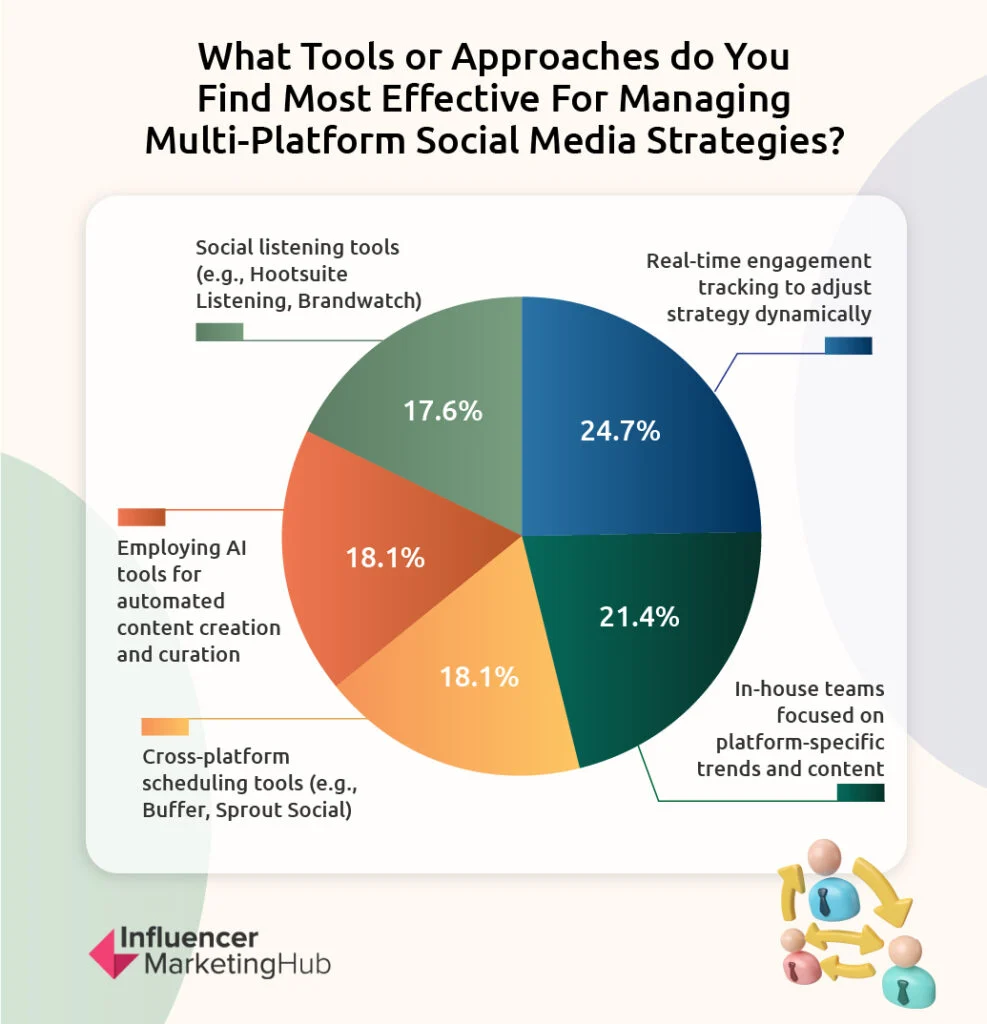
Social Media Demographics Influenced by AI
- On Instagram, users skew 50.6% male, 49.4% female, with males aged 18,34 comprising the largest cohort.
- AI-driven recommendation systems tailor content for key demographic segments, boosting match and resonance.
- Curiosity for AI content rises, 60% of users show interest in AI-generated music, 57% in comedy videos, but less so for ads (34%) and podcasts (35%).
- Younger consumers, especially Gen Z (70%) and millennials (78%), rely heavily on user-generated content (UGC) when making purchases, often supported by AI-driven UGC strategies.
- AI tools help segment audiences by age, gender, and interests, enabling tailored messaging that resonates with specific user groups.
AI in Social Media Marketing
- A rising 61% of organizations apply AI in social media to reduce workload and streamline operations.
- Nearly 38% of marketers report improved efficiency as the main benefit of AI in social marketing.
- Unilever’s AI-driven influencer strategy generated 3.5 billion social impressions and attracted 52% new customers.
- AI handles entire campaigns, images, videos, copy, and targeting for Meta by 2026, enabling brands to launch ads autonomously.
- Pinterest saw a 17% YoY revenue increase to $998 million, fueled by AI-powered ad tools and strong Gen Z engagement.
- Meta’s AI advertising systems, including Advantage+ and automated campaign tools, are projected to contribute significantly to revenue, potentially adding billions annually by 2030, depending on market conditions.
- By automating social media creation, AI empowers smaller brands and SMEs to compete without big agency budgets.
- TikTok’s Symphony tool helps generate ad scripts, video translations, and AI avatars, expanding creative reach.
AI Tools Usage and Trends
- 69% of marketers now see AI as revolutionary and job-creating, not threatening.
- A growing majority, 83%, say generative AI lets them create much more content than before.
- 88% of marketers use AI daily, 93% to speed content creation, 90% for faster decisions, 81% for insights.
- 43% automate repetitive tasks with AI, 43% rate AI as essential to social strategy.
- Around 54% of content marketers use AI to generate ideas, but only 6% rely on it to write entire articles.
- 86% report AI saves them over one hour per day, generating creative ideas.
- AI applications cover emails (47%), text-based posts (46%), video posts (46%), and long-form blogs (38%).
- 64% use AI to better understand customers, 65% report improved SEO results from AI-generated content.
- Nearly 20% of marketers dedicate over 40% of their budget to AI-powered content campaigns.
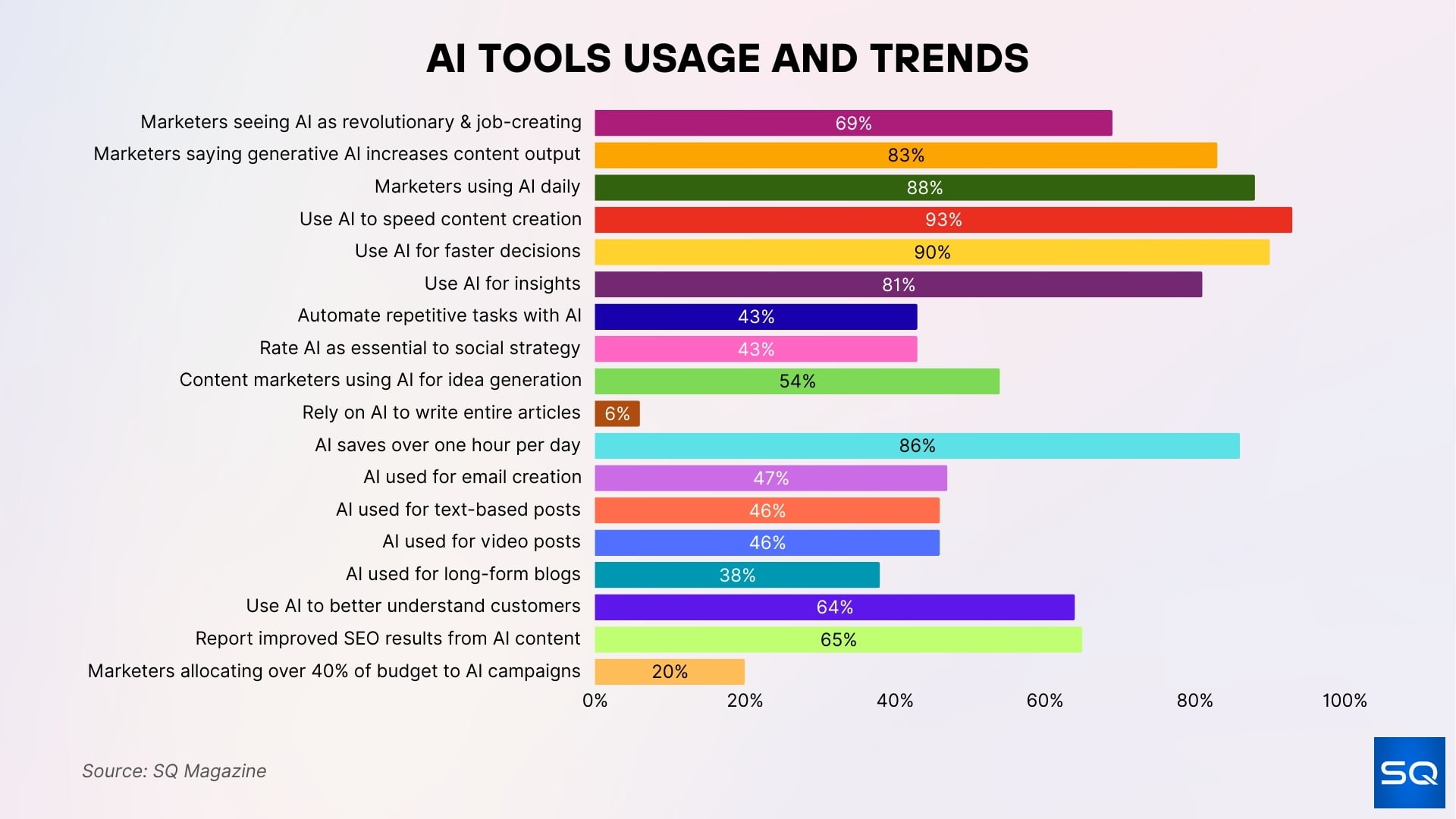
Market Size and Growth of AI in Social Media
- The AI-driven social media market is projected to grow from $2.4 billion (2024) to $8.1 billion by 2030, at a CAGR of 19.3%.
- Another estimate projects the AI social media market to reach $12 billion by 2031, up from $2.1 billion in 2021.
- The broader AI in the marketing sector is valued at $47.3 billion in 2025, with a CAGR of 36.6%, climbing to $107.5 billion by 2028.
- The global generative AI market is valued at $62.8 billion in 2025, forecasted to hit $356 billion by 2030.
- Market expansion fosters more tools aimed at creators, and AI assists in managing businesses, content, targeting, and brand partnerships.
- Meta’s AI investments, $68 billion in 2025, could drive it to capture 22% of U.S. digital ad spend.
- Pinterest’s AI ad tools fueled user growth and revenue, with 578 million monthly users and growing engagement.
Regional AI Adoption in Social Media
- North America and Northern Europe have the highest social media penetration, at 82% and 80.2% respectively.
- The U.S. AI-in-social-market is estimated at $975 million in 2024.
- China’s AI social media market is projected to grow at a 24.1% CAGR, reaching $1.4 billion by 2030.
- AI adoption exceeds 70% in most global regions, with Central/South America trailing at 58%.
- 60% of U.S. companies employ generative AI for a continuous social media presence.
- 79% of business leaders believe AI is essential to remain competitive, 78% expect to increase AI spending soon.
- In regulated sectors, finance and healthcare, AI usage in social media is rising, defying expectations.
Top Tasks for Which Professionals Use AI Tools
- 51% use AI for optimizing content, including SEO and email campaigns.
- 50% leverage AI for creating content such as slides, blog posts, social media updates, and emails.
- 45% rely on AI for brainstorming content ideas.
- 43% use AI to automate tasks and processes.
- 41% apply AI for analyzing data to gain insights.
- 40% utilize AI for conducting research.
- Only 1% use AI for other unspecified tasks.
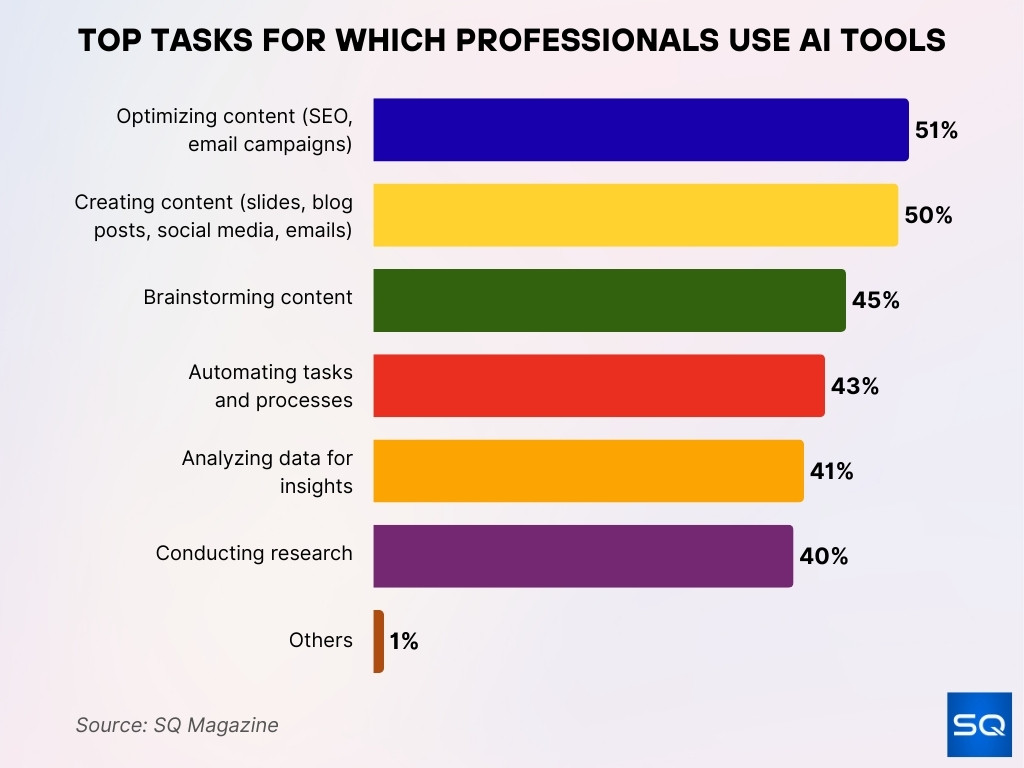
Personalized Recommendations and Targeting
- AI drives over 80% of social media recommendations, boosting relevance and retention.
- Meta’s AI-enhanced Reels recommendations already deliver a ~5% uplift in conversions.
- AI analysis helps brands share posts at times that maximize engagement and surface content that aligns with audience behavior.
- Targeting tools like TikTok’s Symphony can generate ad copy and avatars tailored to niches.
- AI supports predictive trend forecasting, and brands can act on insights before trends peak.
- AI tools allow precise ad targeting, evident in Meta’s and Pinterest’s increased ad efficacy and spend.
- Global marketers (62%) believe labeling AI-generated content improves trust and performance.
AI‑Driven Social Listening and Sentiment Analysis
- 62% of social marketers use social listening tools, ranking them as a top priority.
- Social listening now enables teams to prove ROI with real data, not just vanity metrics.
- Brands using social listening gain faster insight into trends, sentiment, and possible crises, enabling agile responses.
- 82% of social marketers feel confident they can keep up with emerging trends.
- 31% use social listening to analyze cultural trends and guide campaigns toward micro-viral opportunities.
Influencer Marketing Powered by AI
- Influencer marketing is projected to reach $32.55 billion globally in 2025, up 35% from 2024.
- 92% of brands say they use or plan to use AI to support influencer campaign execution and optimization.
- AI tools help identify influencers by audience match, engagement rates, and fraud detection in seconds, increasing selection accuracy by 27%.
- Virtual influencers, such as Aitana López, earn consistent revenue and maintain large followings (250,000+), outperforming some human creators.
- Brands now prefer micro- and mid-tier influencers, with 73% adoption, as AI shows they drive better engagement-to-cost ratios.
- AI enhances campaign personalization, increasing conversion rates by up to 20% and boosting ROI metrics significantly.
- AI content tools automate influencer posts, captions, and video edits, speeding up campaign production by up to 60%.
- AI helps brands predict influencer performance outcomes with up to 85% accuracy, improving pre-campaign planning.
- AI-assisted analytics provide granular attribution, revealing exact influencer-driven conversions and customer actions.
- Companies like TikTok and Meta offer native AI campaign tools to help influencers scale and monetize faster with less manual oversight.
AI in Customer Service and Chatbots
- The global chatbot market stands at $15.57 billion in 2025, up from $2.47 billion in 2021, and projected to grow to $46.64 billion by 2029.
- Over 987 million people use AI chatbots today.
- By 2025, around 80% of companies are either using or planning to adopt AI-powered chatbots for customer service.
- Experts forecast that by 2025, AI will handle 95% of all customer interactions, including voice and text channels.
- The value of the AI customer service market, estimated at $308 million in 2022, is expected to surpass nearly $3 billion by 2032.
- Recent adoption trends show a $1.43 billion increase in chatbot market value in 2025, driven by NLP and ML advancements.
- Half of customers believe AI agents can be empathetic, while 69% of organizations think generative AI can humanize digital interactions.
- 70% of CX leaders consider chatbots adept at creating highly personalized customer journeys.
Automation of Social Media Management Tasks
- AI tools automate scheduling, posting, and content optimization. 83% of marketers say generative AI helps them produce significantly more content.
- Brands reduce labor for routine tasks such as tagging and tracking analytics.
- Platforms report a 35% YoY increase in influencer marketing adoption, enabling faster campaign setup and targeting.
- AI-powered clip tools help creators repurpose media swiftly, and some teams earn up to $30,000 per month from viral short clips.
- Meta’s AI campaign tools align optimal creative with posting timing, freeing planners for strategic work.
- AI data analysis enables marketers to adjust content frequency and format based on real-time engagement trends.
- AI agents handle routine inquiries, and Zendesk predicts automation could cover up to 80% of customer inquiries by 2027.
Audience Segmentation with AI
- AI drives over 80% of content recommendations, improving how audiences discover personalized content.
- Meta’s AI tools deliver a ~5% lift in conversions via nuanced targeting.
- AI enhances demographic targeting, refining messages by age, location, and interests.
- TikTok’s Symphony tool crafts niche ad scripts and avatars tailored to micro-segments.
- 73% of brands now prefer micro- and mid-tier influencers, an AI-driven shift toward high engagement-to-cost ratio creators.
- AI-driven personalization in influencer campaigns can boost conversion rates by up to 20%, while attribution models improve efficiency by up to 30%.
ROI and Efficiency With AI Tools
- Social platforms now account for 17.11% of all online sales in 2025, with global social commerce growing at a 13.7% CAGR and expected to surpass $1 trillion by 2028.
- Influencer marketing globally is set to reach $32.55 billion in 2025, a 35% jump over 2024.
- Brands earn as much as $20 per $1 spent on top campaigns.
- 80% of brands maintained or increased influencer marketing budgets, 47% upping it by at least 11%.
- 71% of social media marketers say AI-created content outperforms non-AI content.
- AI tools save creators over one hour daily, generating ideas, boosting content output without inflated cost.
- AI assistance in customer support may add $16.6 billion to Meta’s revenue in 2025.
AI Challenges and Ethical Considerations
- Americans estimate that only 41% of online material is accurate and human-generated, and 82% support laws requiring disclosure of AI use.
- AI bots form echo chambers and cliques, showing that network structure, not just AI, drives polarization.
- Emotion-sensitive chats improve trust but still lack full human nuance.
- “Chatbot psychosis” is emerging, with users developing delusions after prolonged interaction.
- AI chatbots can shift opinions in under 10 minutes, raising political misuse concerns.
- Illinois banned therapists from using AI chatbots for treatment, citing ethical concerns.
- AI use contributes significantly to carbon and water footprints. AI questions use 10 times more energy than a Google search.
Future Trends in AI for Social Media
- Virtual influencers like Aitana López, with 250,000+ followers, are earning a monthly income.
- Influencer marketing service firms grew from 1,120 in 2019 to 6,939 in 2025.
- 92% of brands are using or open to using AI for campaign support.
- Messaging apps will deepen integration with AI agents, fostering ongoing customer conversations.
- Emotion-aware AI, transparency tools, and stricter labeling will define the future of trusted digital interaction.
Conclusion
This year’s data makes one thing clear: AI is transforming every corner of social media, from content creation and automation to customer care and influencer strategies. It drives higher efficiency, broader reach, and richer personalization. Yet, the path forward demands thoughtful stewardship, balancing ROI with user trust, ethics, and mental well-being. As the technology evolves, so must our standards and policies. The future of AI in social media is as promising as it is responsible, and this article charts the journey ahead.

